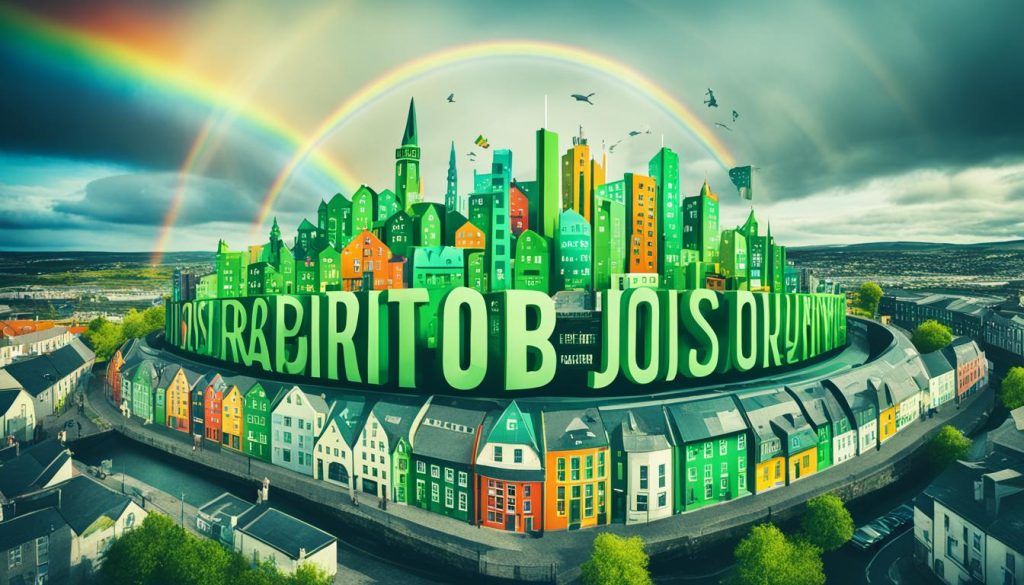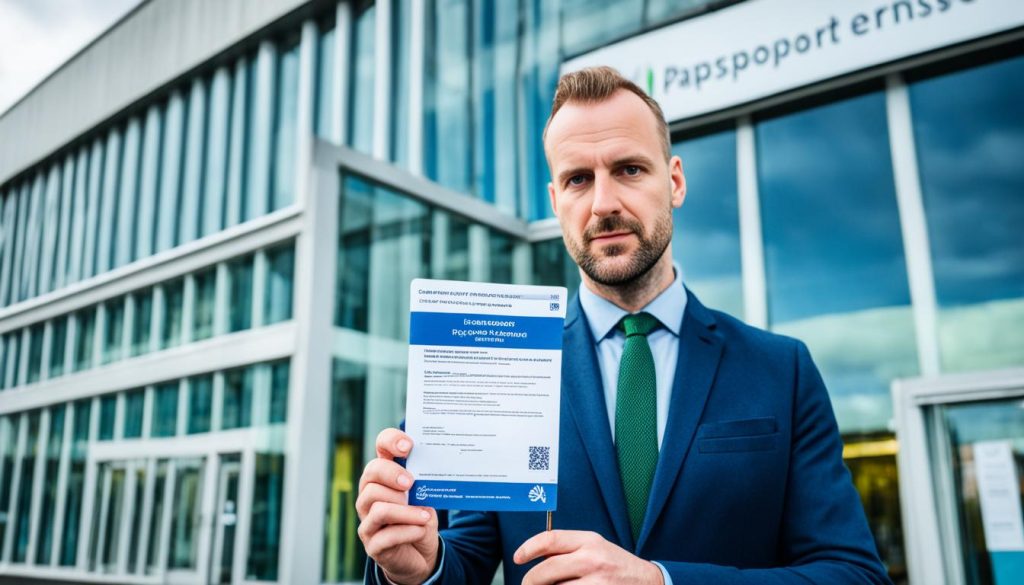Thinking about moving to Ireland? It’s a big step from the UK, so knowing your rights and the steps to take is key.
- Understanding Your Right to Live in Ireland
- Finding a Job in Ireland
- Are you a UK resident planning to relocate to Ireland
- Getting There: Travel Options from the UK to Ireland
- Securing Accommodation: Renting or Buying Property
- Healthcare in Ireland: What You Need to Know
- Setting Up Your Finances: Banking and Taxes
- Education System: Schools and Universities
- Social Security and Pensions
- Registering for a Personal Public Service Number (PPSN)
- Driving in Ireland: Licence and Vehicle Registration
- Integration into Irish Society
- Retiring in Ireland
- Source Links
As a UK citizen, you can live in Ireland freely. But, if your family is not from the EEA or Switzerland, they might need a visa. The Irish government also provides health, education, and social security benefits to help you settle.
Before you move, get to know Irish laws, your tax duties, and social housing rules. Also, remember the rules about bringing pets and goods to avoid surprises.
Key Takeaways
- UK nationals can live in Ireland without any conditions or restrictions.
- Families of UK nationals from outside the EEA or Switzerland may need a visa.
- The Irish government provides extensive services and benefits for new residents.
- Understanding Irish parliamentary democracy and tax obligations is crucial.
- Be aware of customs regulations and pet importation rules during your move.
Understanding Your Right to Live in Ireland
Moving to Ireland from the UK is exciting but knowing the process is vital. It helps ensure you can smoothly settle there. You need to know about Ireland’s visa rules and how to get a residence permit. This protects your living rights in Ireland.
Visa Requirements
As a UK citizen, you usually don’t need a visa for Ireland thanks to the Common Travel Area (CTA). You can easily live, work, and use state services in Ireland without a visa. Even so, it’s smart to keep up with any visa rules. This is especially true if your family members are not UK citizens. They might need different documents.
Residence Permits
UK people may not need a visa, but understanding residence permits is still key for long stays. Thanks to the CTA, you can live and work in Ireland with ease. No need for lots of forms. But, getting a residence permit can be useful. It helps when you need certain services or for paperworks. Always check the latest rules or get advice from Irish immigration services.
Finding a Job in Ireland

Looking for a job in Ireland can be exciting for UK residents. The economy is strong and there’s a high need for various skills. Here, we cover sectors with many job offers and show you how to start your job search.
High Demand Sectors
The Irish job market is vibrant, with specific industries always on the lookout for talent. Important sectors include:
- Technology: Big names like Google, Microsoft, and Facebook have large offices in Ireland, creating many tech jobs.
- Pharmaceuticals and Healthcare: Ireland is a key player in this industry, with companies like Pfizer and Johnson & Johnson growing their presence.
- Financial Services: Dublin is home to the International Financial Services Centre, with lots of jobs in banking and finance.
- Tourism and Hospitality: There’s a booming tourism industry, offering many positions, particularly in hospitality.
Job Hunting Resources
To land a job in Ireland, especially for UK folks looking there, using the right tools is key. Here are some effective strategies:
- Online Job Portals: Sites like IrishJobs.ie, Jobs.ie, and Indeed list many job openings in different fields.
- Networking Events: Go to events like Career Zoo and GradIreland Live to meet employers directly.
- Recruitment Agencies: Companies like CPL and Hays help people from other countries find jobs in Ireland.
- LinkedIn: A solid LinkedIn profile and networking with Irish companies can also help snag a job offer.
Using these resources wisely can really improve your chances of getting a good job in Ireland. It could make your move there a great decision.
Are you a UK resident planning to relocate to Ireland
Starting a new life in Ireland is thrilling but also full of challenges. This guide is here to make your UK to Ireland move seamless. We cover everything from job chances, reconnecting with family, or just needing a change.
To start, get to know the legal steps and documents for UK folks in Ireland. Knowing what paperwork you need helps you avoid trouble later. Make sure to get your documents sorted early on. Getting advice can also be a big help.
Understanding local culture is key to settling in well. Embracing Irish customs will enhance your time there. Building local friendships will help you feel at home quickly.
Don’t forget the logistics of moving. Choose a moving service with experience in UK to Ireland moves. They’ll keep your stuff safe and get it there on schedule.
Learning about your new area will make things easier. Our UK to Ireland relocation guide covers legal tips to getting along in your new home. It’s set to make your move worry-free and full of joy.
Getting There: Travel Options from the UK to Ireland

Moving from the UK to Ireland is an exciting step. You have several travel options, each with its own advantages. Choose from quick flights, scenic train or ferry rides, or driving your own car. You’ll find a way to travel that fits your needs perfectly.
Flights
Flying is a quick and popular way to get to Ireland. There are many flights each day from big airports like Heathrow, Gatwick, and Manchester. You can choose from airlines like Aer Lingus and Ryanair. They fly often to cities like Dublin and Cork, making your journey fast and comfy.
Trains, Ferries, and Buses
If you’re not rushing, consider the ferry. It offers a lovely view on your way to Ireland. Stena Line and Irish Ferries sail often from the UK to places like Dublin Port and Rosslare Harbour. Add a train journey with your ferry trip for an even more relaxed trip. Once in Ireland, there are many bus services to take you around.
Driving Your Car to Ireland
Driving to Ireland lets you be free on your trip. Taking your car on the ferry is a great choice. It means you can bring more of your stuff and go wherever you want in Ireland. Just make sure your car is ready for the trip. Get ready for beautiful scenery and adventures ahead.
Securing Accommodation: Renting or Buying Property
Moving to a new country is a big challenge. This is especially true when finding a place to live in Ireland. Knowing how to navigate renting or buying can make things easier.
Looking to rent in Ireland? It’s smart to start early. Cities like Dublin, Cork, and Galway have a busy rental market. Platforms such as Daft.ie and Rent.ie show many options, from apartments to houses. Having your employment proof and references ready can set you apart.
Thinking about buying a home in Ireland comes with different things to consider. It’s important to research neighbourhoods, understand legal steps, and secure a mortgage. Real estate agencies like Sherry FitzGerald and DNG offer help. A solicitor skilled in Irish property law is also crucial.
Steps to securing accommodation in Ireland:
- Determine your budget and preferences.
- Use reliable property websites to view listings.
- If renting, prepare your documentation in advance.
- If buying, consider employing a local estate agent and solicitor.
- Visit potential properties to assess their suitability.
Whether you’re renting or buying in Ireland, it is important to carefully explore each option. The right choice will make your new life in Ireland comfortable and happy.
Healthcare in Ireland: What You Need to Know
When you move to Ireland, getting to know its healthcare system is key. It includes both public and private healthcare. Knowing how these services work is important for your health in a new place.
Public Health Services
Public health services in Ireland are paid for by taxes. They offer doctor visits, hospital care, and community health services. If you’re eligible, you can get these services for free or at a low cost. This depends on how much you earn and your specific situation.
Private Healthcare Options
Private healthcare in Ireland is another choice. It’s good for those wanting faster access to doctors or special treatments. Many choose private insurance to pay for these services. This can offer extra comfort and security.
How to Apply for Healthcare Cards
To use public health services in Ireland, you need a healthcare card. The main ones are the Medical Card and the GP Visit Card. The Medical Card lets you use many health services for free. The GP Visit Card gives you free visits to your doctor. You can apply for these cards online at the Health Service Executive (HSE) website. Just provide the needed info about your earnings and where you live.
Setting Up Your Finances: Banking and Taxes
Moving from the UK to Ireland needs a plan for your money. It’s key to get how the banks and taxes work in Ireland. This knowledge will help keep your finances safe.
Opening a Bank Account
First things first, opening a bank account in Ireland is vital. Big banks like AIB, Bank of Ireland, and Ulster Bank welcome expats. You’ll need a passport and something like a utility bill for address proof. Getting your account ready early means you can smoothly pay for your living costs and more.
Understanding Tax Obligations
It’s important to know about Ireland’s tax rules for your money plans. Ireland has a tax system where what you earn decides how much tax you pay, and everyone gets some tax off through credits. All expats must sign up with the Revenue Commissioners to know their tax dues. Keeping up with tax news in Ireland will help you stay right with the law and keep tax trouble away.
Double Taxation Agreements
The UK and Ireland have a deal to stop double tax – the Double Taxation Agreement. It makes sure you don’t pay tax on the same income in both places. This is a big deal for UK expats working or earning in Ireland. Talking to a tax expert who knows the Irish tax system well can help you not pay more tax than needed. They can guide you on using the DTA well.
Education System: Schools and Universities

When you move to Ireland, it’s key to know about its education. Ireland has a range of primary and secondary schools and top-notch universities. These places make learning deep and accessible for everyone.
Primary and Secondary Education
Primary school in Ireland starts at four or five years old and goes on for about eight years. Then, students move to secondary school for five or six years. This stage gets them ready for important exams like the Junior Certificate and the Leaving Certificate.
- Primary education is free and a must.
- Secondary schools offer both state-supported and paid options.
- The learning plan covers academics, sports, and personal growth.
Higher Education Opportunities
Irish universities like Trinity College Dublin and University College Cork are famous worldwide. They offer a huge choice of courses for undergrad and postgrad students. These places are celebrated for strong academics, lively campuses, and rich research chances.
- An undergraduate degree is usually a three to four-year journey.
- Postgrad courses can last one to two years, longer for research degrees.
- Many Irish universities help international students with scholarships and funds.
- Book an appointment with the Department of Social Protection.
- Prepare your ID: passport, proof of address, and any additional documents.
- Go to your appointment and give them your documents.
- Wait for them to process your application and give you a PPSN.
If you’re after great schools or aiming for prestigious universities in Ireland, the education system promises excellent teaching and growth chances for all students.
Social Security and Pensions
When you move from the UK to Ireland, understanding social security in Ireland is crucial. It’s also vital to know how this impacts your pensions. We’ll cover the important points of these arrangements here.
National Insurance Contributions
Keeping up with your National Insurance Contributions ensures you keep getting benefits and full pension rights in Ireland. The UK and Ireland have made agreements to ensure you don’t lose out. Making regular contributions affects your eligibility for benefits and pensions, so it’s important to keep up with any changes in the rules.
Accessing UK State Pension in Ireland
If you’re a UK national living in Ireland, you can still get your UK State Pension. Thanks to deals between the countries, the process is quite easy. Just make sure the pension service knows where you are and that your details are current. By taking these steps, you ensure your pension rights in Ireland and secure your income for retirement.
Registering for a Personal Public Service Number (PPSN)

Before you settle in Ireland, getting a PPSN is key. The Irish Personal Public Service Number (PPSN) lets you access many public services. This includes healthcare and social welfare benefits. We’ll guide you through getting your PPSN.
When moving to Ireland, a PPSN should be high on your list. First, book a meeting with the Department of Social Protection. Bring important ID, like your passport, and proof of where you live in Ireland.
To register for a PPSN, follow these simple steps:
Getting your PPSN makes moving to Ireland smoother. It helps you use local services and support. Make sure to get this done quickly to avoid any trouble later.
Driving in Ireland: Licence and Vehicle Registration
Moving from the UK to Ireland means adapting to new driving rules. We’ll help you switch your UK licence to an Irish one and explain the car registration steps.
Converting Your UK Driving Licence
If you want to drive in Ireland, you need to exchange your UK driving licence. It’s an easy process. Just send an application to the National Driver Licence Service (NDLS). Make sure you have your residency proof and ID ready to avoid delays.
Vehicle Registration Process
Planning to bring your car over from the UK? You must register it in Ireland. Start by getting a Vehicle Registration Tax (VRT) assessment. After you pay the VRT, you get Irish plates for your car. Keep all your paperwork in order and note important deadlines for a hassle-free process.
Vehicle Registration Tax (VRT)
The Vehicle Registration Tax (VRT) is a must for registering vehicles in Ireland. The tax depends on how much CO2 your vehicle emits and its model. Getting a pre-registration VRT estimate helps with budgeting. Following VRT rules is crucial for keeping your car legally on the road and enjoying trouble-free driving in Ireland.
Integration into Irish Society
Moving to Ireland means more than relocating your things. It’s about diving into local culture and becoming part of the community. This journey will make your time here fulfilling and help you settle in.
Learning Local Customs and Phrases
To fully integrate, get to know Irish customs and phrases. Saying “Dia duit” for Hello and “Slán” for Goodbye is a good start. Join in local festivities like St. Patrick’s Day and enjoy traditional Irish music in pubs.
Getting Involved in the Community
Joining your new community is the best step towards integration. Get involved by attending local events, volunteering, or joining clubs. These are great ways to connect and make Ireland feel like home.
Retiring in Ireland
Many UK expats find retiring in Ireland appealing. The country is known for its beautiful landscapes and friendly people. It offers a calm lifestyle perfect for those looking to retire. You can choose from peaceful coastal towns or lively cities, depending on what you prefer.
When planning your retirement in Ireland, it’s vital to consider finances. You need to understand how your UK pension will work. Thankfully, the UK and Ireland have agreements to avoid double taxation. This means you won’t be taxed twice on the same income. Speaking with a financial advisor who knows about pensions in both countries is wise. They can help you make the most of your retirement money.
Healthcare in Ireland is excellent for retirees. You have access to both public and private healthcare services. Getting a Healthcare Card from the Health Service Executive (HSE) can make healthcare more affordable. This card significantly lowers your medical costs, letting you enjoy your retirement without worrying about healthcare expenses.

















